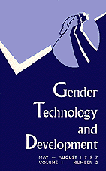Knowledge and/as power: a feminist critique of trade related intellectual property rights
Barwa, S and Rai, S. M. (2003) 'Knowledge and/as power: a feminist critique of trade related intellectual property rights', Gender, technology and development, 7 (1): 91-113. Read here
The final versions of these papers were first published in Gender, Technology and Development, Vol 7, Issue 1, year 2003, pp 91-113, by SAGE Publications Ltd. © SAGE Publications, 2003. All rights reserved. This material may not be copied or reposted without permission from SAGE Publications.
User Copyright Notice
All material included on this Web site is the exclusive property of SAGE Publications, or its licensors and is protected by copyright and other intellectual property laws. The download of the file(s) is intended for the User's personal and noncommercial use. Any other use of the download of the Work is strictly prohibited. User may not modify, publish, transmit, participate in the transfer or sale of, reproduce, create derivative works (including coursepacks) from, distribute, perform, display, or in any way exploit any of the content of the file(s) in whole or in part. Permission may be sought for further use from Sage Publications Rights and Permissions Department: please contact Sandra Tharumalingam: sandra.tharumalingam@sagepub.co.uk . By downloading the file(s), the User acknowledges and agrees to these terms.
The web-site of each of these journals is located at www.sagepub.co.uk under the heading Journals and the individual Journal title.”
|
Abstract |
| The article attempts to define a research agenda that will explore the relationship amongst gender, knowledge, innovation and property rights against the backdrop of the recent processes of market liberalisation and transformation of the relationship between states and the global economy. It suggests that Trade Related Intellectual Property Rights are institutionalising the historically exclusionary bounded definitions of what counts as knowledge and thus denying the role of millions of women in the production of knowledge over time. It concludes that this property regime challenges women to engage in the struggle over meanings of knowledge, invention and property. |

Download Article in
PDF format
![]()
